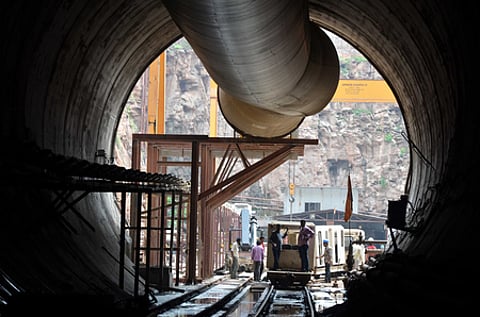

NEW DELHI: In a decisive move to enhance tunnel safety across India, the National Disaster Management Authority (NDMA) has initiated the development of national guidelines for tunnel construction and operation.
To formulate the comprehensive safety protocols, NDMA has signed a Memorandum of Understanding (MoU) with the Foundation for Innovation and Technology Transfer (FITT), an industry-academia interface established by the Indian Institute of Technology (IIT) Delhi. The project aims to finalise the guidelines by April next year.
The initiative is being led by Professor Deepanshu Shirole and Professor Ramanathan Ayothiraman from IIT Delhi, under the guidance of a newly-formed Technical Expert Committee (TEC). As outlined in the MoU, the TEC will ensure technical oversight and draw upon a wide range of expertise to shape the safety framework.
The guidelines will span all three critical phases of tunnel infrastructure - pre-construction, construction, and post-construction - and will include a database of tunnelling experts, as well as guidance notes tailored for state administrators.
This comes in the wake of the Silkyara Bend–Barkot tunnel collapse in Uttarakhand, which trapped 41 workers for 16 days in November 2023.
The tragic Silkyara incident highlighted the gaps in India’s tunnel safety mechanisms, particularly the lack of dedicated codes and disaster response protocols.
Currently, tunnel construction relies on general engineering standards and international practices, which do not comprehensively address disaster preparedness and rescue operations specific to tunnels.
The TEC is chaired by NDMA member Krishna S Vatsa and includes representatives from nine prominent agencies such as Rail India Technical and Economic Service (RITES), Ministry of Road Transport and Highways (MoRTH), Military Engineering Services (MES), Border Roads Organisation (BRO), Central Public Works Department (CPWD), and the Coalition for Disaster Resilient Infrastructure (CDRI). These agencies will contribute expert inputs, monitor the project’s progress, and review both interim and final reports.
In a recent development, NDMA has written to relevant authorities to nominate experts for active participation in the project. The national guidelines are expected to lay a robust foundation for tunnel safety, ensuring better preparedness, resilient infrastructure, and faster response in case of disasters.